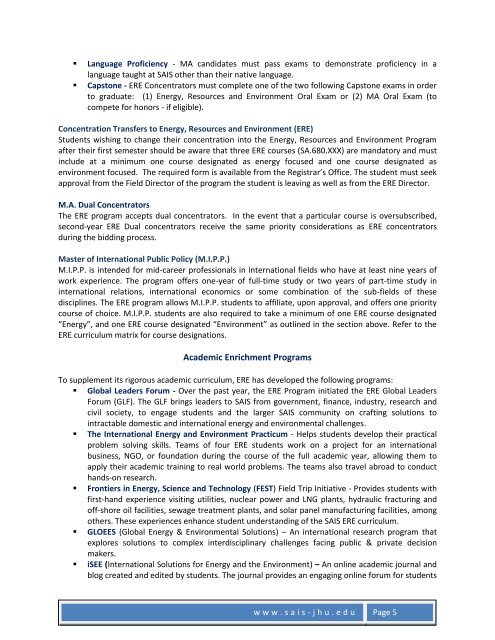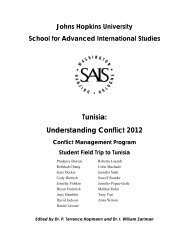energy, resources and environment program - Johns Hopkins ...
energy, resources and environment program - Johns Hopkins ...
energy, resources and environment program - Johns Hopkins ...
You also want an ePaper? Increase the reach of your titles
YUMPU automatically turns print PDFs into web optimized ePapers that Google loves.
• Language Proficiency - MA c<strong>and</strong>idates must pass exams to demonstrate proficiency in a<br />
language taught at SAIS other than their native language.<br />
• Capstone - ERE Concentrators must complete one of the two following Capstone exams in order<br />
to graduate: (1) Energy, Resources <strong>and</strong> Environment Oral Exam or (2) MA Oral Exam (to<br />
compete for honors - if eligible).<br />
Concentration Transfers to Energy, Resources <strong>and</strong> Environment (ERE)<br />
Students wishing to change their concentration into the Energy, Resources <strong>and</strong> Environment Program<br />
after their first semester should be aware that three ERE courses (SA.680.XXX) are m<strong>and</strong>atory <strong>and</strong> must<br />
include at a minimum one course designated as <strong>energy</strong> focused <strong>and</strong> one course designated as<br />
<strong>environment</strong> focused. The required form is available from the Registrar’s Office. The student must seek<br />
approval from the Field Director of the <strong>program</strong> the student is leaving as well as from the ERE Director.<br />
M.A. Dual Concentrators<br />
The ERE <strong>program</strong> accepts dual concentrators. In the event that a particular course is oversubscribed,<br />
second-year ERE Dual concentrators receive the same priority considerations as ERE concentrators<br />
during the bidding process.<br />
Master of International Public Policy (M.I.P.P.)<br />
M.I.P.P. is intended for mid-career professionals in international fields who have at least nine years of<br />
work experience. The <strong>program</strong> offers one-year of full-time study or two years of part-time study in<br />
international relations, international economics or some combination of the sub-fields of these<br />
disciplines. The ERE <strong>program</strong> allows M.I.P.P. students to affiliate, upon approval, <strong>and</strong> offers one priority<br />
course of choice. M.I.P.P. students are also required to take a minimum of one ERE course designated<br />
“Energy”, <strong>and</strong> one ERE course designated “Environment” as outlined in the section above. Refer to the<br />
ERE curriculum matrix for course designations.<br />
Academic Enrichment Programs<br />
To supplement its rigorous academic curriculum, ERE has developed the following <strong>program</strong>s:<br />
• Global Leaders Forum - Over the past year, the ERE Program initiated the ERE Global Leaders<br />
Forum (GLF). The GLF brings leaders to SAIS from government, finance, industry, research <strong>and</strong><br />
civil society, to engage students <strong>and</strong> the larger SAIS community on crafting solutions to<br />
intractable domestic <strong>and</strong> international <strong>energy</strong> <strong>and</strong> <strong>environment</strong>al challenges.<br />
• The International Energy <strong>and</strong> Environment Practicum - Helps students develop their practical<br />
problem solving skills. Teams of four ERE students work on a project for an international<br />
business, NGO, or foundation during the course of the full academic year, allowing them to<br />
apply their academic training to real world problems. The teams also travel abroad to conduct<br />
h<strong>and</strong>s-on research.<br />
• Frontiers in Energy, Science <strong>and</strong> Technology (FEST) Field Trip Initiative - Provides students with<br />
first-h<strong>and</strong> experience visiting utilities, nuclear power <strong>and</strong> LNG plants, hydraulic fracturing <strong>and</strong><br />
off-shore oil facilities, sewage treatment plants, <strong>and</strong> solar panel manufacturing facilities, among<br />
others. These experiences enhance student underst<strong>and</strong>ing of the SAIS ERE curriculum.<br />
• GLOEES (Global Energy & Environmental Solutions) – An international research <strong>program</strong> that<br />
explores solutions to complex interdisciplinary challenges facing public & private decision<br />
makers.<br />
• iSEE (International Solutions for Energy <strong>and</strong> the Environment) – An online academic journal <strong>and</strong><br />
blog created <strong>and</strong> edited by students. The journal provides an engaging online forum for students<br />
w w w . s a i s - j h u . e d u Page 5
















